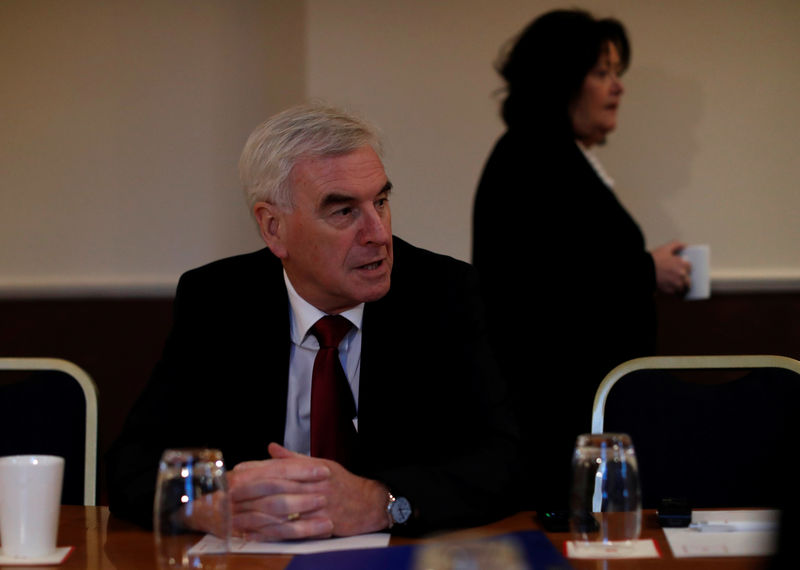By Andrew MacAskill
LONDON (Reuters) - Prime Minister Theresa May could eventually get a Brexit deal through parliament if she negotiated a compromise with the opposition Labour Party, the second most powerful man in the party told Reuters on Wednesday.
May's Brexit deal suffered a crushing defeat in parliament on Tuesday, triggering political chaos that could lead to a disorderly exit from the EU, a reversal of the 2016 decision to leave or a compromise deal of some sort.
The Labour Party's finance policy chief, John McDonnell, said Labour would support May if she agreed to stay in a permanent customs union with the EU, a close relationship with its single market and greater protections for workers and consumers.
"We will support a deal that brings the country back together, protects jobs and supports the economy," McDonnell said. "We have had that open door policy all the way through. For two years she has not contacted, not approached us, not reached out."
With the ruling Conservative party divided, the opposition party holds great influence over the eventual outcome of Brexit. It is difficult to see how any Brexit plan can pass the House of Commons without the support of some of Labour's 256 lawmakers.
In an indication of the scale of the political crisis gripping Britain, May has indicated she is ready to reach out to opposition lawmakers in cross-party talks to find an amicable divorce deal to leave the EU.
But Labour like much of Britain is deeply split over Brexit, with many younger supporters in urban areas enthusiastic supporters of the EU, while many supporters in the party’s traditional heartlands back leaving the bloc.
The party is formally committed to carrying out Brexit but says all options including a new referendum would be on the table if May fails to secure parliamentary support for a deal and cannot be removed from power.
A group of 71 Labour lawmakers on Wednesday urged their leader Jeremy Corbyn to swing behind a second referendum on remaining part of the European Union.
Corbyn, a veteran eurosceptic who in 1975 voted “No” to Britain’s membership of the then-European Community, is far more wary of a calling a second referendum than many of his centrist Labour colleagues.
BLOCKING NO DEAL
McDonnell, who describes Karl Marx as one of his main influences, said there was no majority in parliament for leaving the EU without a deal so the two most likely options are a compromise deal or a national election.
"It is a bizarre situation but here I am, the shadow chancellor, going on the news to steady the markets because the Tories and the existing chancellor can't do it," he said.
"The reason that I am trying to do that is because there are an overwhelming majority in parliament against a no deal. We will use every parliamentary mechanism to prevent a no deal."
McDonnell, 67, said he still prefers a snap election to win for Labour its own mandate for an EU exit based around a permanent customs union with the EU, rather than holding a new Brexit referendum.
"Our view is that we have should have a general election while having a debate on Brexit amongst all the other issues as well, a much wider debate but you can also choose the team that will then do the negotiation," he said.
McDonnell said it is increasingly likely that the government will have to ask for a extension to the formal process of leaving the EU, which is known as Article 50.

"The next fortnight will be critical," he said. "The more time it takes up over the next couple of weeks, the more likely the government is to have to ask for an extension."